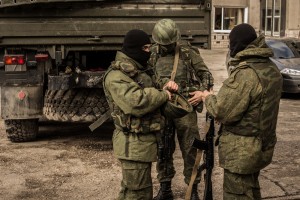
UKRAINE — Ukraine renewed its attacks against armed pro-Russia separatists Tuesday after the president called off a unilateral cease-fire, carrying out air and artillery strikes against rebel positions in eastern Ukraine.
Defense Ministry spokesman Oleksiy Dmytrashkovsky said forces “opened artillery fire, carried out air strikes at the strategic points of the terrorists and places where they are concentrated,” the Interfax news agency reported.
He said one service member was killed and 17 wounded by rebel attacks over the past 24 hours and an Su-25 attack aircraft was damaged. There was no immediate casualty toll from the rebels.
On Monday, Ukrainian President Petro Poroshenko ended a 10-day cease-fire he had called to try to persuade the rebels to lay down their weapons, return seized border posts and hold peace talks. He had called the cease-fire unilaterally and rebels agreed to join it three days later.
Poroshenko said the cease-fire had been violated more than 100 times by rebels, although each side blamed the other for the continued fighting. He said he gave up on the peace initiative after key conditions, such as turning over border crossings and international monitoring of the cease-fire, were not met.
The end of the cease fire raises serious questions about what Ukrainian forces will accomplish now. They were ineffective over more than two months of low-intensity fighting against the rebels before the cease-fire.
Rebels remain in control of the town of Slovyansk in the eastern Donetsk region, which has declared independence from Poroshenko’s government in Kiev, and at one point shot down a military transport, killing 49 service members.
European leaders have been pressing Russian President Vladimir Putin to use what they say is his influence with the rebels. The West says Russia is sending weapons including tanks and rocket launchers to the rebels and allowing Russian citizens to cross the border to fight, claims Russia rejects.
A summit of EU leaders on Friday warned Russia would face new sanctions unless there was progress by Tuesday.
But two rounds of four-way phone talks among Poroshenko, Putin, Germany’s Chancellor Angela Merkel and French President Francois Hollande on Sunday and Monday did not produce enough agreement for Poroshenko to extend the cease-fire.
European leaders have threatened a new round of economic sanctions against Russia if Poroshenko’s peace conditions were not met.
In Brussels, ambassadors for the European Union’s 28 governments discussed the situation in eastern Ukraine but decided Tuesday they were not ready to immediately impose new sanctions against Russia, officials said.
“The picture on the ground is mixed, it’s a very fluid situation,” one EU official said. The diplomats agreed to intensify preparations for new sanctions that could then be decided upon at their next meeting Monday, the official added.
A diplomat from a major EU country said experts would compile a list of those responsible for fomenting unrest in eastern Ukraine who could be targeted by new sanctions. Those additional travel bans and asset freezes could be slapped on individuals and companies, the diplomat said. The EU has so far only sanctioned individuals.
Both the EU official and the diplomat spoke on condition of anonymity because they weren’t allowed to discuss the closed-door talks publicly.
Associated Press writer Juergen Baetz contributed to this report from Brussels.